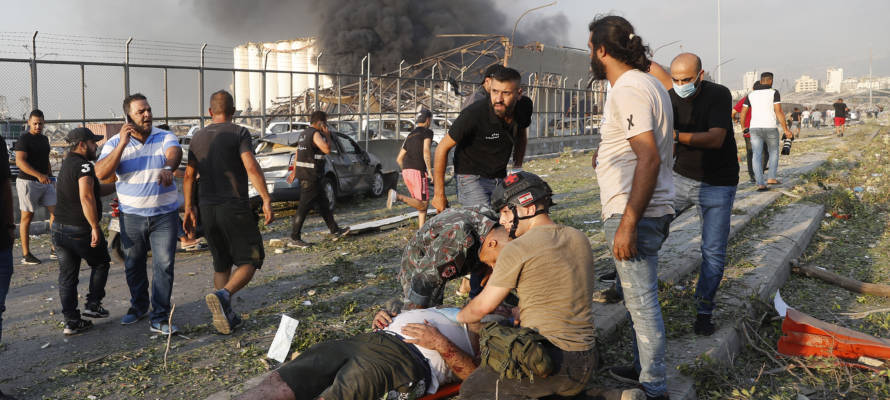The stockpile of weapons-grade ammonium nitrate and the collateral damage it caused to the Beirut port may well have been earmarked for Israel.
By Alex Traiman, JNS
Many of Israel’s modern military accomplishments have defied all odds and logic. Surprise victories in Israel’s War of Independence in 1948, Six-Day War in 1967 and Yom Kippur War in 1973 will forever stand among Israel’s most miraculous and unlikely historical achievements.
This past week, while smoke and debris covers Beirut, Israel may have averted a disaster.
When a massive stockpile of weapons-grade ammonium nitrate exploded in the Beirut port on Aug. 4, it was without a doubt a tragedy of horrific proportions. At least 150 innocent civilians were killed and thousands more wounded. The damage to the city of Beirut, and to Lebanon’s main seaport, will take years to repair.
Yet for Israel, there is one major consolation: The stockpile of ammonium nitrate and the collateral damage it caused may well have been earmarked for Israel.
While Israel and the rest of the international community have been offering humanitarian aid to Lebanon in the wake of one of the largest explosions since the Chernobyl nuclear reactor blew in 1986, the greatest aid to the people of Lebanon would be the complete disarmament and expulsion of Hezbollah.
Israel should now be staunchly making the case to the international community that weapons in the hands of irresponsible actors—and particularly international terror organizations—can only end in the death of innocent civilians.
It was only one week prior to the massive explosion that Israeli Prime Minister Benjamin Netanyahu and Defense Minister Benny Gantz held a joint press conference following an attempt by Hezbollah to infiltrate Israel’s northern border.
We thwarted an infiltration attempt by a Hezbollah terror squad in northern Israel an hour ago. No injuries to IDF troops were reported.
We continue to stand ready to defend Israel’s border from any enemy threat. pic.twitter.com/8NHmGeINsP
— Israel Defense Forces (@IDF) July 27, 2020
Netanyahu stated, “We take a grave view of this attempt to infiltrate our territory. Hezbollah and Lebanon bear full responsibility for this incident and any attack from Lebanese territory against Israel. Hezbollah should know that it is playing with fire.”
When terrorists play with fire, the results are almost inevitably going to turn deadly.
Just several months ago, Israel’s Mossad security agency reportedly provided Germany with significant evidence of Hezbollah’s weapons storage, including ammonium nitrate. It was this information that led Germany to formally ban Hezbollah from operating in its country.
Similarly, The Daily Telegraph revealed in 2019 that U.K. intelligence agencies, acting on a tip from a foreign intelligence agency (the Mossad according to a senior Israeli official), found some three tons of ammonium nitrate in a raid on four London properties back in 2015. The ammonium nitrate was stored in thousands of disposable ice packs.
In 2019, the IDF published a video detailing Hezbollah’s precision-guided missile program. It is currently estimated that Hezbollah has more than 150,000 mortars, rockets and missiles stockpiled for use against Israel.
Security experts have similarly indicated that it was an initial explosion of stockpiled weapons in an adjacent portside hangar that acted as the detonator for the large stockpile of ammonium nitrate.
In 2018, ahead of a U.N. Security Council meeting, Netanyahu called Hezbollah’s stockpiling of weapons intended for Israel among Lebanese civilians “a double war crime.”
In 2016, Hezbollah leader Hassan Nasrallah gave a chilling speech indicating that an explosion of ammonium nitrate in Israel’s Haifa port could carry the same explosive charge as a nuclear bomb.
During the 34-day military conflict between Israel and Hezbollah in 2006, the terrorist organization fired approximately 4,000 rockets and missiles against Israel, at a rate of approximately 100 per day.
And Hezbollah has been using explosives to perpetrate terror attacks for decades. A bombing of American and French peacekeeping forces in 1983 killed 307. The explosive blast was reported to be the equivalent of more than 21,000 pounds of TNT.
Acting as a primary state-sponsored terror actor of the Islamic Republic of Iran, Hezbollah has wreaked havoc across Lebanon and Syria, and remains the most lethal threat against Israeli population centers.
For the last several years, Iran has been consistently smuggling weapons to its terror proxy, via a land bridge across Iraq and Syria, through the Beirut-Rafic Hariri International Airport, and most notably through the Beirut seaport, where the ammonium nitrate was stored in a warehouse adjacent to the water.
While grieving over the deaths of innocent civilians, Israel must be extremely grateful that this stockpile was not detonated anywhere close to its own border. And now seeing firsthand how much damage can be caused by ammonium nitrate, one need only imagine the damage that could be caused should Iran successfully smuggle a nuclear weapon into Hezbollah’s hands.
During the first Gulf War of 1991, Saddam Hussein fired 42 Scud missiles at Israel. During the barrage, only one Israeli reportedly died—of a heart attack due to a nearby explosion. The lack of damage to Israel was a phenomenon of miraculous proportions.
That nearly 3,000 tons of weapons-grade ammonium nitrate likely earmarked for use against Israel will now never reach its intended target is a similar miracle.
Yet despite the severe damage caused by Hezbollah’s “work accident,” the stockpiling of weapons against Israel remains a grave threat. A campaign to fully disarm Hezbollah must be immediately launched.
For as long as Hezbollah continues to have missiles pointed at Israel, the Jewish state will live in constant fear of attack. Peace in the region will never be reached until Hezbollah is fully disarmed.
